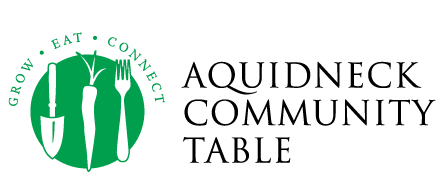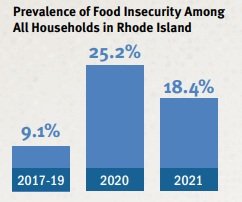Story by MJ Santry and Bevan Linsley
Photos by MJ Santry
It was a blustery day when I asked Betsy Blair and Jim Van Winkle to chat with me at our new winter market location at the lovely Stoneacre Garden. The chill wafting from the nearby wharf through the brick alley buildings reminds even the most seasoned New Englander that it’s time to bust out the thermals. I knew that it was not just the bitter cold affecting their hesitation: along with a barely detectable southern drawl, Jim and Betsy had an endearing humility about them, an almost imperceptible embarrassment at being in the hypothetical spotlight for their volunteerism.
Jim and Betsy are volunteer “gleaners” on behalf of the Dr. Martin Luther King Jr. Community Center in Newport (MLKCC) at our farmers markets. At the close of market days, as vendors begin to pack up their stalls, you can usually find Jim and Betsy swooping in with large green plastic bins, making their way from station to station collecting unsold produce donated by our farmers and vendors for donation and delivery to the MLKCC food pantry, or “Produce to the People” program (formerly known as “Veggie Days”).
If gleaning is a new term to you too, fret not. “I hadn’t heard of it either, and it’s in the bible! In biblical times, farmers would leave some of their crops in the field so that the poor could come to get them.'' Jim is right, gleaning is far from being a new activity. Gleaning is the act of collecting unharvested crops from farmers' fields, crops not economically profitable to harvest, and is now an increasingly widespread solution to food equity, by simply getting that unused produce to people who need it.
When Jim and Betsy first started gleaning at the market, they were met with some initial hesitation from a few farmers unfamiliar with the practice, but over time, these strangers became familiar faces, and as their relationships grew to friendships, so did the symbiotic exchange of food. “It’s been very productive, we’ve made very good relationships with the farmers and the vendors, and they’re very good to us. In some cases, they will pick extra, knowing that we’re going to glean and that their donation going to go to people in need, not the compost bin.” Now, they’re seasoned pros; between the two of them, they've logged a whopping 10,000 volunteer hours for MLKCC.
2021 graphic, 2020 stats on Hunger & Poverty in Rhode Island: 11% of households (47,700) are food insecure, meaning they are unable to afford adequate food (compared to 11.7% nationally) 4.7% of households (20,398) have very low food security, meaning they miss meals and experience hunger (compared to 4.6% nationally)
Some may be surprised to hear of the need for hunger services in Newport; “It’s a community that has a lot of need, that a lot of people don’t see… there’s a lot of people that don’t live here year-round, and they’re here in the summer when it’s go-go-go, big boom, streets are crowded, money’s flowing - in the dead of the winter, when people don’t have enough food . . . that’s a different experience.” Despite the imagery associated with Newport, it has the fifth-highest poverty rate in the state of Rhode Island; one in eight people are unsure of where their next meal will come from.
This gleaning partnership began in 2015 when ACT asked if unsold market produce could be helpful at MLKCC’s food pantry and MLKCC responded with a resounding Yes! sending volunteers and a van to every Wednesday farmers market. Both organizations were surprised by the volume of vendor donations, both perishable and shelf stable, and the collaboration has grown in every successive year, but it wasn’t until Jim and Betsy arrived and volunteered to be the Saturday crew that gleaning was possible on both market days.
The winter sun is setting quickly, and we decide to move inside to continue our interview; their southern hospitality radiates throughout our conversation, in the cozy candle-lit atmosphere inside Stoneacre. After living in Texas for 35 years, Jim & Betsy landed in Rhode Island, somewhat haphazardly. Since retiring early from their initial careers in technology, both have been involved with many non-profit organizations, in various ways, from volunteer, to donor, to board members, and so later, while working in the charter boat industry, when Jim had become familiar with Newport and the boating community here, and the tall ship Oliver Hazard Perry was looking for help, and one of the OHP board members suggested Jim, he said to Betsy “there’s a 1% chance that there might be something happening in Newport”. Years later, they seem like hardy New Englanders to me, but Betsy says, “Not quite hardy”.
Jim and Betsy fell in love with sailing long ago. Before moving to Rhode Island, they sailed across the pacific with their daughter, in 7th grade at the time, and one brave tutor. Together, they spent 13 months crossing the Pacific Ocean, visiting 31 countries, charting 17,000 miles.
The biggest difference between Texas to Newport they see, you may ask? “It’s neighborly here” was the serious answer, followed by a close second, “I miss Mexican food.” Betsy admits and Jim chimes in, “You can only eat so much clam chowder, but there’s no limit on how many cheese enchiladas you can eat.”
Betsy hit the nail on the head of my own experience as a newcomer to Newport, it is neighborly. She describes the suburban sprawl of their lives in Texas, “If our daughter wanted to have a playdate, you shipped off half an hour in your car. Here? In the first week of living here, I met four neighbors. FOUR. In Texas, I met that many in four years.”
As we wrap up our conversation, Jim heads out into the cold to start the process of gleaning. Betsy asks how I like living here, being new to Newport. She shares a tip: “Somebody told me… - ‘cuz we were unfamiliar with snow, and I was so excited the first time it snowed - to walk over to Thames Street and look up at Trinity Church with fresh snow. And . . . it was amazing. It had snowed overnight, I got up early and walked over there and it was this sea of white, and then this beautiful, white church. . . and it was like – this is where I’m supposed to be.”
It certainly seems that way to me, and we are better for it.





